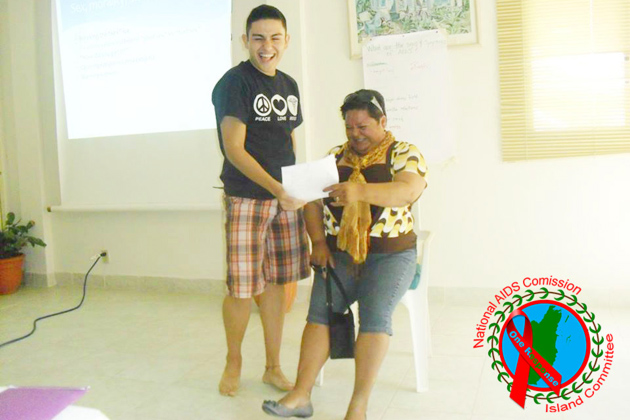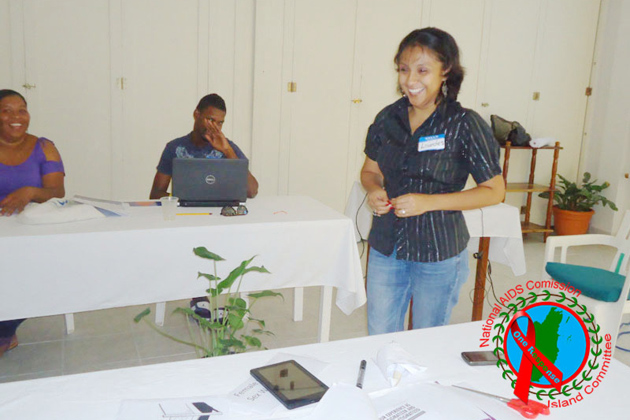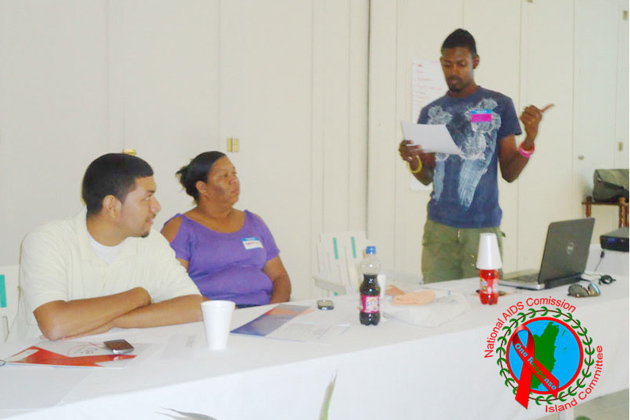PRESS RELEASE – National AIDS Commission Island Committee – July 30, 2013 – From 27 July 2013 to 28 July 2013 the National AIDS Commission (NAC) Island Committee participated in a workshop/training aimed at learning how to identify stigma and discrimination and how to battle it. Members of the NAC Island Committee participated alongside members of the newly formed Caye Caulker Health Committee- now inducted into the Island Committee. Through the facilitation of Nurse Lourdes Heredia from Corozal Community Hospital and the NAC Corozal Committee the training was made possible with the support of USAID Central America Capacity Project and IntraHealth International. The training/workshop was held at the Sunbreeze Hotel conference room. The workshop/training certified that participants in attendance have the education, training and resources necessary to tackle stigma and discrimination specifically aimed towards individuals living with HIV/AIDS and their friends and families.
Prior to identifying what stigma and discrimination is the participants refreshed their knowledge of HIV/AIDS (Human Immunodeficiency Virus/Acquired Immunodeficiency Syndrome) including the explanation of what the virus is, means of transmission and ways to prevent the spread of the virus.

Following the refresher the participants explained what stigmatization and discrimination is. Beyond definitions the participants identified how these attitudes and actions affect persons living with HIV/AIDS, how these affect families and friends close to persons living with HIV/AIDS, and how to defeat both stigmatization and discrimination.
The following table shows a summary of the information:
What is stigma?
Stigma is a negative attitude that creates prejudice simply because an individual or group of persons is different.
What is discrimination?
Discrimination means treating one person differently from another in a way that is unfair – for example, treating one person less favorably simply because he or she has HIV/AIDS.
How are the two manifested?
Stigma and discrimination destroy a person’s dignity; marginalizes affected individuals; violates basic human rights; markedly diminishes the chances of a stigmatized person of achieving full potential; and seriously hampers pursuit of happiness and contentment. The effects can be both mental and physical and can be long lasting.

What are the effects on the stigmatized and discriminated?
*Verbal and physical abuse
*Fear of disclosing information to medical professionals, which may lead to not receiving or adhering to medication regiments and increased transmission.
*Reduced self-esteem and confidence
*Social isolation, exclusion from society
*Withdrawal, depression and other psychosocial problems
How can you combat it?
*Build an understanding of and commitment to stigma and discrimination reduction and build an understanding of what HIV/AIDS is. Educate yourself.
*Provide leadership on the necessity of reducing stigma and discrimination. Inspire leadership, understanding, and high-level commitment regarding the need to seriously expand efforts to respect the dignity of all humans.
*Use or promote approaches that address the root causes of stigma and discrimination. Implement attitudes that tackle the actionable causes of stigmas, for example lack of awareness of stigma and discrimination and their negative consequences.
*Realize that your neighbor, your friend, your family member, your coworker, or peer is human and he/she like you has a story that is worth respecting.

It is imperative that the community joins the NAC Island Committee to fight stigmatization and discrimination against persons living with HIV/AIDS and more importantly stigma and discrimination as a whole. NAC Island Committee invites the communities of both Ambergris Caye and Caye Caulker to join them in creating an accepting and respectful community where no person regardless of status feels stigmatized and discriminated against.
A special thanks to the following individuals that contributed to the success of the workshop: Pedro’s Hotel of San Pedro for graciously providing accommodations for our participants from neighbouring Caye Caulker providing as well as San Pedro Bze. Express for providing transportation from and to Caye Caulker and of-course USAID Capacity Project, Nurse Lourdes Heredia and all the participants.












